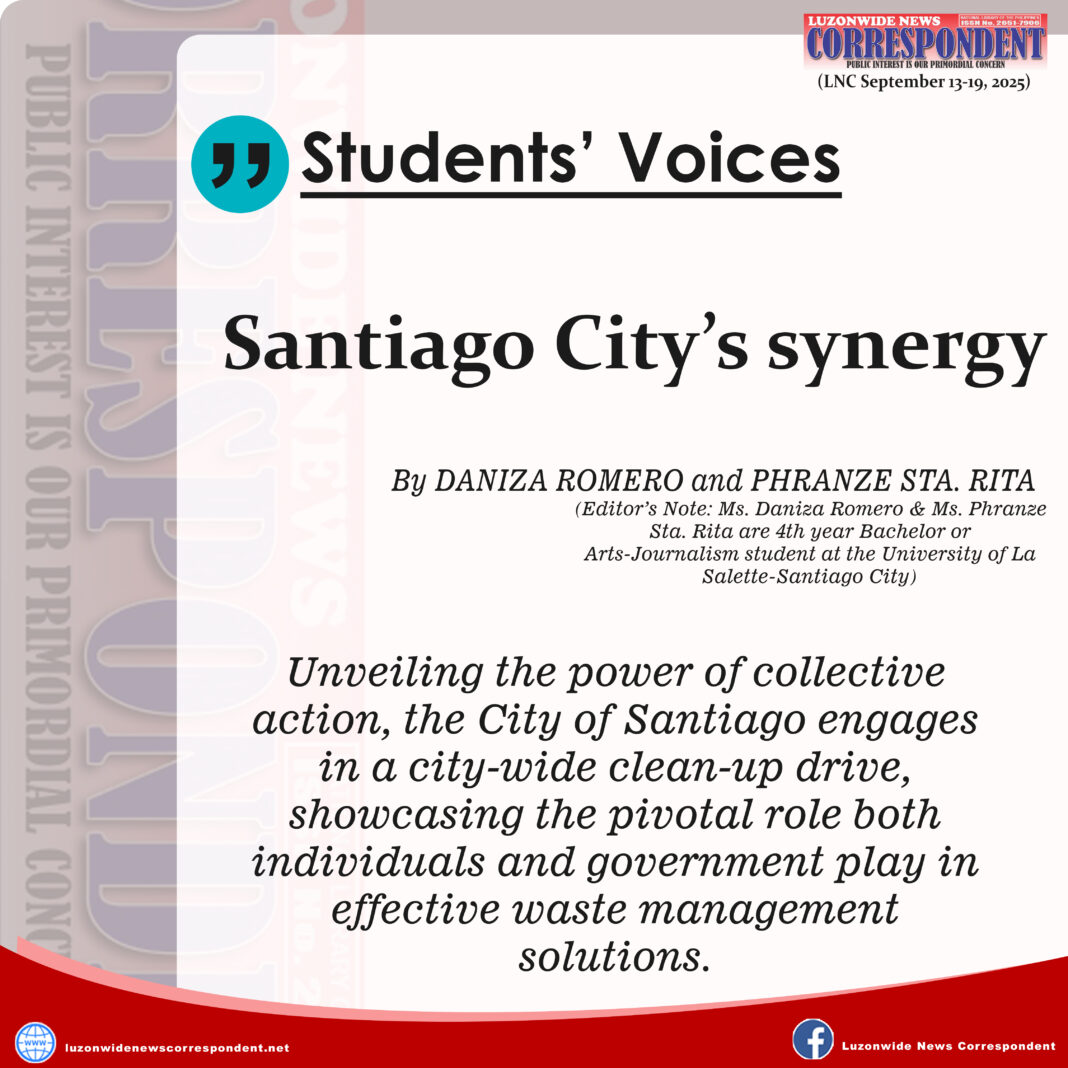By DANIZA ROMERO and PHRANZE STA. RITA
(Editor’s Note: Ms. Danize and Ms. Phranze are 4th year Bachelor of Arts-Journalism student at the University of La Salette, Santiago City.)
Unveiling the power of collective action, the City of Santiago engages in a city-wide clean-up drive, showcasing the pivotal role both individuals and government play in effective waste management solutions.
In a world struggling with increasing environmental problems, waste management is becoming a critical global dilemma. As countries seek sustainable solutions, the Philippines rises to the challenge, with Santiago City exemplifying a proactive attitude through innovative practices and community engagement.
The Public Market is at the forefront of trash management initiatives in Santiago City. Placed beside Jollibee Bayan, the Municipal Recycling Facility (MRF) is a vital facility with a committed staff of 16 men and 22 women. The daily schedule of 11 trucks collecting waste and ensuring proper disposal at the Sanitary Landfill in San Jose is indicative of the city’s dedication. The waste breakdown is impressive and shows a careful approach: 29.90% of wastes are residual/special/hazardous, 11.10% are recyclable, and 66% are biodegradable.
While it may seem like a global issue such as waste management can only be done and addressed by large corporations or governments, the importance of practicing proper waste management extends to every individual and local community. It is an act that is crucial for maintaining a clean and healthy environment.
However, Government leadership plays a crucial role in addressing the environmental problems that our world faces. The complexity of environmental issues, such as climate change, deforestation, pollution, and biodiversity loss, requires strong and effective governance to tackle them effectively.
On January 6, the local government unit of the City of Santiago joined in a city-wide clean-up drive they titled “Kalinisan Day” in which Barangay and SK officials participated together with other volunteers. According to Santiago City Mayor Atty. Sheena Tan’s Facebook post, that the implementation of this program is in line with Department of the Inferior Local Government (DILG) Memorandum Circular No. 001-2024 which aims to raise public awareness and participation in environmental responsibilities through proper waste management, encourage LGUs to invest in related programs and projects, and set up a recognition system for the cleanest Local Government Units.
In commemoration of the National Zero Waste Month every January of the year, the youth and the citizens of Barangay Divisoria are united in the initiative for sanitization. The movement was led by the Sangguniang Barangay at Sangguniang Kabataan to clean from Purok 1 to Purok 7.
Sanggunian ng Kabataan Chairman Krizha Marie Mendoza of Barangay Divisoria shared that being part of such a huge program is an important action taken on the local units’ part to further promote sustainable development practices that could benefit both present and future societies. “Environmental sustainability is a key component of achieving long-term economic growth while preserving natural resources for future generations,” Mendoza said. She added that she was delighted to be part of a nationwide movement and be able to contribute, even a little bit, to exterminate the recurring issue of improper waste management in her locality, not only as a community council member but also as an individual of her barangay.
More about the DILG’s newest memorandum also known as ”Kalinisan sa Bagong Pilipinas Program”, the circular promotes the active involvement of stakeholders: cooperation not only among LGUs, but also with the national government agencies civil society organizations, private sector entities, and local communities in addressing environmental issues. It recognizes that collective efforts are essential for successful environmental rehabilitation. With that, the circular wants to emphasize compliance with existing environmental laws and regulations, including the Clean Water Act, Ecological Solid Waste Management Act, and other relevant legislation.
To sum up, the waste management measures implemented by Santiago City serve as a testament to the effectiveness of teamwork. With committed utility staff, a well-placed MRF, and an organized waste breakdown, the city offers a prime example of an integrated approach. Santiago City is an example of how effective local solutions may be in fostering a cleaner, healthier future, particularly in light of the global environmental concerns that the city faces. This highlights how crucial proper garbage disposal is to protecting ecosystems, reducing pollution, and building sustainable communities on a worldwide scale. Together, every individual’s initiative has a big impact on the health of the planet.#







